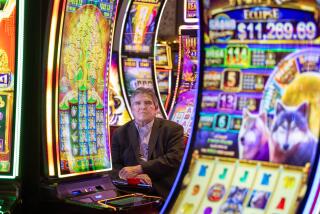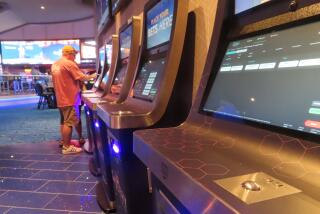California’s Indian casinos slowly recovering from recession
California’s $7-billion Indian gambling industry endured a sizable drop in revenue during the recession, but tribal casino operators say an improving economy has helped them slowly rebound.
In the last year, Indian casino guests have begun to spend more at slot machines and card tables and in adjoining hotels, generating enough revenue to pay for expansions and new attractions and once again hire staff, casino operators say.
Tribal gambling revenue and profit are rarely reported publicly and industry estimates are often late as a result. A new report estimates that Indian casinos nationwide saw a 1% decline in revenue in 2009 compared with the previous year.
That was the first drop in gambling revenue since Indian casinos were legalized in 1988, according to the analysis released Wednesday by Alan Meister, an economist with Arlington, Va.-based Nathan Associates.
The drop was even steeper in California, the nation’s largest generator of Indian gambling revenue. From 2008 to 2009, the most recent years for which financial numbers were available, Indian casinos in the state saw a 5% decline, from $7.3 billion to $6.9 billion, according to Meister’s report.
“We were significantly off,” said Mark Macarro, tribal chairman of the Pechanga Band of Luiseño Indians, which operates Pechanga Resort & Casino in Temecula.
Still, the operators of Pechanga and other Indian casinos in California said gambling revenues have rebounded slightly, enough to let them reinvest in the businesses.
For example, last year Pechanga hired back 500 employees who were laid off during the recession, and the Morongo Casino Resort & Spa in Cabazon recently purchased a 36-hole golf course in Beaumont.
Macarro said he was not sure whether the casino would ever see revenue and spending return to pre-recession levels. “I think we are in a new normal,” he said.
The drop in revenue in 2009 followed a slow-growth period that began about five years ago, according to Meister’s report.
From 1996 to 2005, the Indian gambling industry enjoyed revenue growth of about 15% annually. But starting in 2006, growth slowed steadily each year, slipping into negative numbers for the first time in 2009. Meister attributes the decline to national economic woes and restrictions imposed on tribes by lawmakers and the courts.
During the recession, casino operators said, guests placed smaller bets and spent less on food and drinks. Some casinos responded by reducing the minimum denomination on slot machines and lowering the minimum bet at card tables.
“We were off for a couple of years, and now we see revenues flatten out,” Morongo Tribal Chairman Robert Martin said. “I don’t want to say we’ve seen the bottom, but we’ve flattened out.”
The rebound has helped nine California casinos fund expansions or renovation plans in 2010 and enabled four other casinos to make such plans for the near future, according to Meister’s report.
Among the venues that are expanding is the Lucky 7 Casino, operated by the Smith River Rancheria band of Indians, near the Oregon-California border.
Kara Miller, chairwoman of the tribe’s board, said revenue dropped between 10% and 15% during the recession but had improved enough in the last year so that the tribe can fund a 10,000-square-foot expansion to the 21,400-square-foot casino.
In October, the Morongo band of Indians purchased the 36-hole golf course that was formerly known as the East Valley Golf Club. But Martin said the tribe held off on buying the course for more than a year, wondering whether it was a good investment, considering the tough economic times.
Property records indicate the tribe bought the golf course, about 15 miles west of the casino, from the East Valley Golf Club for $10 million.
“We had to hold off because the economy was so bad,” he said. “Nobody was sure what was going to happen.”
Martin said the tribe hoped to use the golf course to entice casino guests to stay longer.
Martin also said the casino recently started to hire back several mid-level managers who were laid off during the recession. “We are at the bottom of the food chain when the economy turns down,” he said.
Still, the Meister report predicts a brighter future for Indian casinos.
“The economy will improve in time, bringing back consumer confidence, disposable income, spending on casino gambling and financing for future casino development,” the report says.
And despite the decline in Indian gambling, the report says tribe-owned casinos nationwide suffered less of a decline in revenue than other gambling ventures.
For example, revenue from commercial casinos nationwide, such as those in Las Vegas and Atlantic City, N.J., dropped about 8% from $30 billion in 2008 to $27.6 billion in 2009, according to the report.
Meanwhile, gambling revenue from card clubs, such as the Bicycle Casino in Bell Gardens and Hollywood Park Casino in Inglewood, declined about 5% from $1.27 billion in 2008 to $1.21 billion in 2009, the report says.






